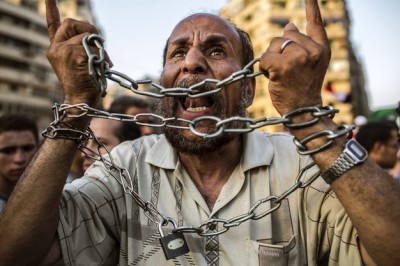by Ghassan Karam

There is still life in an Arab Spring that started with great expectations over 19 months ago and that has had many ups downs as it moved from one country to another and even from one continent to another. The great hopes of the Arab masses got a great lift that their long term sufferings under illegitimate regimes and totalitarian rule is coming to an end when Mohammad Bouazizi set himself on fire on December 17, 2010 in Tunis. That act of immolation set the Arab street on fire.
In no time the Tunisian strong man, Zine el Abidine Bin Ali was forced to flee the country to Saudi Arabia. This was followed by the daily demonstrations in Tahrir square of Cairo which also saw Hosni Moubarak leave office in disgrace. The Yemeni uprising ended in an arrangement that replaced the ousted president, Ali Abdallah Saleh, with his Vice president and the promise of major reforms. Bahrain on the other hand saw major peaceful demonstrations that have been put down by brute force of the government at the urgings and military support of Saudi Arabia. Muammar Qadaffi’s 40 year rule ended ignominiously with the aid of a NATO bombing campaign authorized by the UN Security Council and requested by the Arab League. The Syrian killing fields however are still going on and even gaining in their intensities.
The success or failure of events and developments is never simple and straight forward to assess since different perspectives and visions play a major role in colouring such evaluations. It is not uncommon to discuss in academic circles whether the American and French revolutions have succeeded or whether they were even revolutions. It is not the aim of this rather short piece to delve into this very complicated and multifaceted issue of whether the Arab Spring has been a true revolution or whether it has succeeded in at least setting the Arab states on the path to political integrity and democracy. Suffice it to say that if political revolutions are to be understood as a process that leads to fundamental change in the basis upon which society is built and in a relatively short time then the Arab Spring has set up that spark in motion with varying degrees of success.
The announcement earlier today that Mr. Morsi is the next Egyptian president is a very hopeful development. It might be true that the Egyptian military has set itself up as the final arbiter of what changes are to be made in the Egyptian political establishment but the mere fact that a card carrying member of the Moslem Brotherhood has been elected to the office of the presidency has prevented to counter revolutionary forces of the former PM, Chafic, from setting the relative advances won by the demonstrators back. The MB deserves to be given the chance to establish a new Egypt on democratic principles. After all, Tariq Ramada, the grandson of Hassan Al Banna, has been writing and lecturing for over a decade that the MB has evolved in its thinking to the point where it is a strong supporter of democratic processes. It is worth noting that Mr. Ramada has often denounced Wahabism as idolatrous and as a disease that poisons the mind. To him Islam is compatible with democracy and modernity and he favours a structure of governance similar to that of modern Turkey rather than Saudi Arabia. Moslem Brotherhood has finally won the chance that it has sought for decades, the chance to rule. Let us hope that they prove worthy of the trust of the Egyptian people and that they deliver on their promises of fair, just modern democratic and tolerant government. If they do that then the momentous occasion of having Mohammad Morsi become the first popularly elected president after the ouster of Hosni Moubarak could prove to be a major revolutionary event whose ripples would be felt in Syria and then ultimately in the GCC. A real, genuine and far reaching Arab Spring must bring about legitimate democratic governments all throughout the Arab world. That includes not only Syria but the GCC and the rest of North Africa. As much as there is to celebrate as a result of the last 19 months of political change in the Arab World I shall resist uncorking the bubbly until the winds of change become established across MENA.

Leave a Reply
You must be logged in to post a comment.